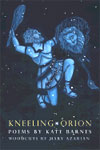Welcome to The Writer's Almanac Bookshelf, where you'll find highlighted interviews of poets heard on the show.
Kate Barnes
Q: What was it like to be raised by two working writers?When I was very little someone asked me what I would like to do when I grew up, and I said I would like to marry a businessman. I had already observed the difference between my jolly businessman uncle, who left for his office every morning and my stamping, snorting creative father who was in the house all the time.
But I usually took my parents' writing for granted. My sister and I were aware that writing came hard to our father and easily to our mother. We knew that it was all right to interrupt her, but not him; we understood without being told that she was unobtrusive about her work from a wish to make things easier for him.
People often ask me how it was to grow up in the household of two working writers. They ask this wistfully. It's plain that they idealize the thought of it; that it sounds like a creative paradise to them, interesting and exciting. When they ask about it, I think of an early Freudian analyst who was a friend of my mother's. She said that, given the nature of unconscious rivalry, she had never worked with married writers who didn't experience some tension.
Artists' and writers' households are not known for their peacefulness. Our family had enough tension to go around. But it had a lot else as well. The people who ask about it are right in a way; it may not have been a paradise, but it was interesting and exciting.
Q: What is your process of writing?
My process of writing is like the story of my life; most of it changes as it goes along, although the small-farming landscape I grew up in has remained its underlying source of energy. I went through all the usual stages: rhyming in childhood, blurting in my teens, and then, bit by bit, picking up the manner of my own time and also becoming a passionate reviser. At one point the process came to a complete halt; I stopped writing for more than twenty years while I was raising four children.
What I didn't stop was reading other people's work, both new and old—I was always in love with poetry. I had been lucky in having a mother who read lots of it out loud to her children. I think I was also lucky to go through college excitedly reading and writing poems for my own pleasure and never getting credit for it (at least until my last semester when I took a course with that admirable poet Edward Weismiller).
I did have two necessary heart's affections in place, a love of poetry itself and a love of language. I also had, from watching my poet mother, some sense of the way people write what wells up in them and then work hard to bring it to completion. I understood that poems never just flow (or hardly ever—and if one does come that way it's a gift, a recompense for the concentrated work we've already done).
So what is my writing process now? You might say I get by with a little help from my friends. I do lots of "telephone writes" with my friend Elizabeth Tibbetts (In the Well, Bluestem Poetry Award, Kansas, 2002). She and I call up, give ourselves an hour or two, suggest a subject, and then call back and read each other whatever we got, no cheating.
I don't believe these writes wound the meditative aspect of our work, that half-conscious innerness. After all, inspiration can come in at any time—including during revision. Elizabeth and I pick real subjects, not games, and we've agreed that, if we get an urge to write about something else, we should go for it. Our writes are a good way of plunging into concentration, and it's amazing how often one gets at least a few lines one can keep.
I am thankful for anything that helps me to keep going. Now that I'm in my middle seventies and have leukemia—which uses up some of my strength—I write less and revise even more. As Stanley Kunitz put it at ninety-five: "The poems are there, but they lie under the debris of life. One has to dig for them very much harder than one had to at the beginning; poetry, in one's youth, is so largely a glandular activity."
Most of all, I just want to keep on working, want the depth which writing poetry brings to my life, its necessary distillation.
Kate Barnes, who lives and writes on a farm in Appleton, Maine, was the state's first Poet Laureate from 1996 to 2000. Her published collections of poetry include; Crossing the Field, Where the Deer Were, and most recently, Kneeling Orion (Godine, 2004).
